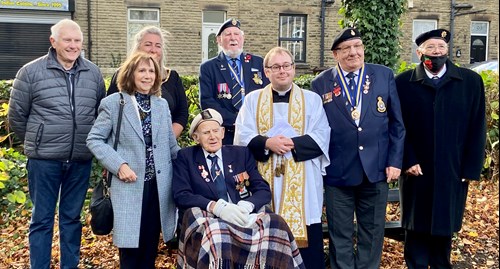
Birthday honour for a hero of World War Two
A Bench has been unveiled in Horbury Memorial Park to celebrate to 100th Birthday of
Arctic Veteran
John Hirst.
Fr Christopher Johnson blessed the bench during a small service attended by family and members of the Royal British Legion who had
arranged the honour. Horbury Common Lands Trust bestowed a grant to buy the bench. Also in attendance was
Councillor Tracey Austin
mayor of Wakefield.
Mr Hirst's role during the war was a signalman in the Merchant Navy; the role of the ships on the Arctic convoy was to carry vital supplies through Nazi attacks to keep Russia's war effort alive. Between August 1941 and May 1945 this fleet of Merchant vessels delivered more than 4 million tons of cargo. 85 Merchant Navy and 16 warships were lost. SS Empire Cowper was the vessel carrying John Hirst on his first ever mission in April 1942. Four days after leaving Iceland they had to scatter owing to a severe gale. Once reassembled they continued to Murmansk where they were bombed continually by the Luftwaffe as they discharged their cargo.
Mr Hirst takes up the story: “On April 10, 1942 we left Murmansk to return to the UK. Shortly after clearing land we lost power, fell behind the convoy and were sighted by a Junkers 88 which proceeded to bomb us.
When ordered to abandon ship, John helped launch two lifeboats and then escaped on a life raft with two other survivors. He was fortunately picked up two hours later by the rescue ship Paynter.
The Empire Cowper was sunk in the Barents Sea with the loss of nine of her crew, who are commemorated at the Tower Hill Memorial, London.. Upon landing at Seydisfjord in Iceland the survivors were taken aboard HMS Liverpool where the first person Mr Hirst encountered was his neighbour and a distant cousin from Horbury . Twelve days after his journey began John arrived home in the uniform of a Russian sailor. After recuperation time John returned to the sea and served for six and a half years on board eight different ships.
Convoy QP10 was an arctic convoy, conditions were atrocious as can be seen in the picture here. Decks and equipment iced up. To survive for 2 hours on a raft was a bit of a miracle.

John Hirst was also involved in the campaign to have the Arctic veterans’ role in the war recognised by the UK government. Eventually they were awarded the Arctic Star in 2013. The fight for recognition wasn’t over though. Russia had long wanted to bestow their own medal on those men who had played such an important part in their war, but were prevented from doing so due to British government protocol surrounding the awarding of foreign military medals. Finally an agreement was reached between Vladimir Putin and the then prime minister David Cameron and all veterans were recognised with the Ushakov medal in 2015 - the highest Russian naval award. Every five years Mr Hirst receives a commemorative medal from the Russian government to thank him for his service during the war.